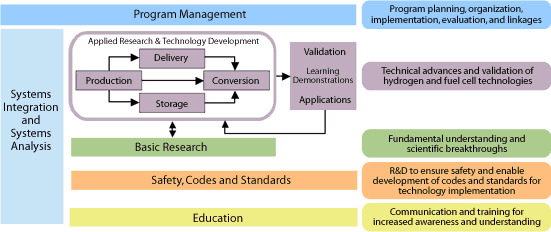Program Areas
The DOE Hydrogen Program is comprised of the following major activities.

- Hydrogen Production – production of hydrogen from a diversity of energy resources (fossil, nuclear, renewables), using a variety of process technologies (thermochemical, biological, electrolytic and photolytic)
- Hydrogen Delivery – hydrogen distribution systems for refueling stations and stationary power sites
- Hydrogen Storage – storage of hydrogen (or its precursors) on vehicles or within the distribution system
- Conversion/Fuel Cells – conversion of hydrogen to electrical or thermal power; use of hydrogen to power vehicles via polymer electrolyte membrane (PEM) fuel cells, for auxiliary power units on vehicles, or for stationary applications
- Applications/Technology Validation – successful field tests and evaluation; technical validation of systems in real-world environments; learning demonstrations to feedback to and refocus R&D
- Safety – safety in DOE-sponsored R&D activities and in the market place
- Codes and Standards – perform underlying research to facilitate development of model codes and standards for domestic and international production, distribution, storage and utilization of hydrogen
- Education – informing the public about the attributes and use of hydrogen; training of individuals for a hydrogen economy
- Basic Research – fundamental research on advanced materials for hydrogen storage, fuel cell components, bio-inspired materials, and solar-energy-based hydrogen production; modeling, simulation and analysis of key processes and mechanisms
- Systems Analysis – supports Program decision-making processes by evaluating existing and emerging technologies through multiple pathways utilizing a fact-based analytical framework to guide the selection and evaluation of R&D projects, and providing a sound basis for estimating the potential value of research efforts.
- Systems Integration – understanding the complex interactions between components, systems costs, environmental impacts, societal impacts, and system trade offs to develop well-integrated and optimized hydrogen and fuel cell systems
